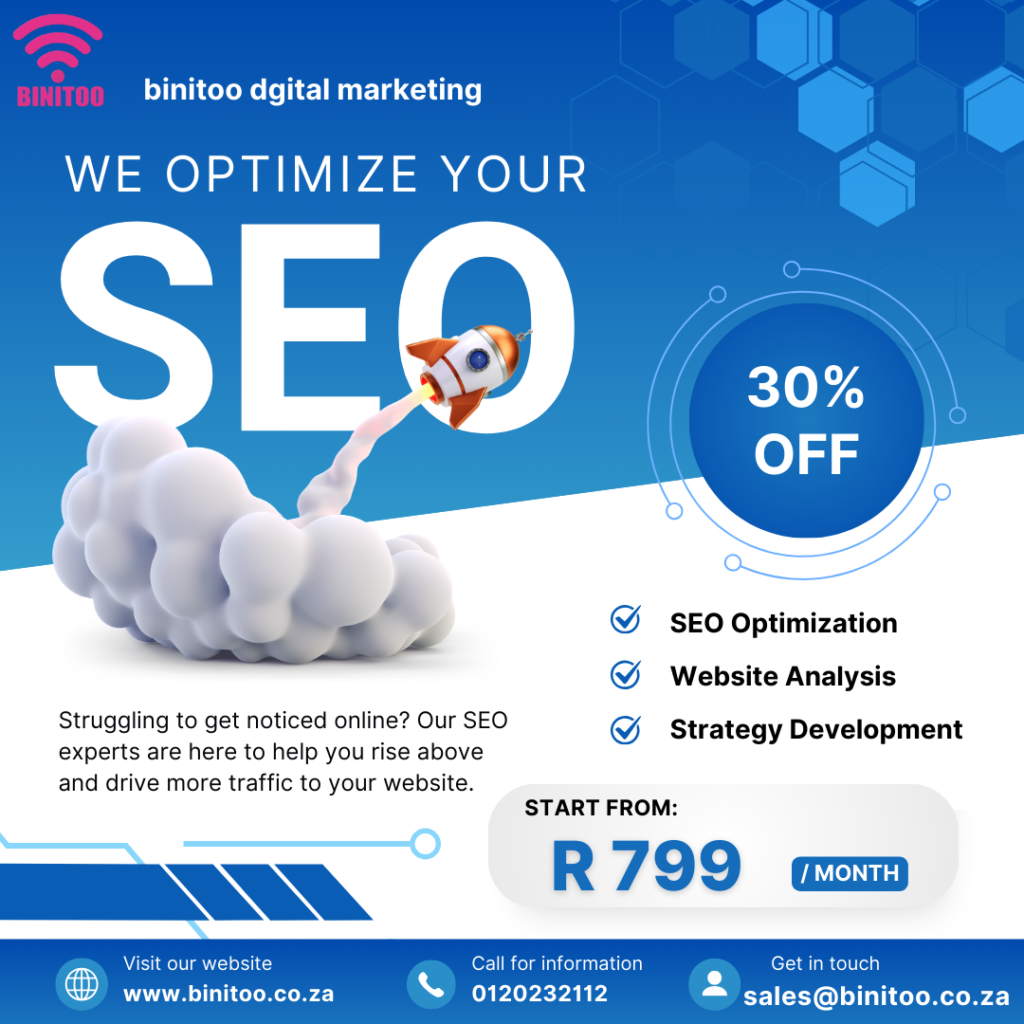Seo the 1 Ultimate Guide to rank Your Website
the seo
Are you struggling to get your website noticed on search engines? Are you confused about all the jargon surrounding SEO? Look no further! In this ultimate guide, we will demystify the world of SEO and provide you with actionable steps to optimize your website for search engines.
From keyword research to on-page optimization techniques, we’ve got you covered. Learn how to identify the right keywords for your business and effectively incorporate them into your website content. Discover the secrets of creating compelling meta tags and optimizing your website’s structure for better crawlability.
But SEO is not just about keywords and tags. We will delve into the importance of high-quality content and show you how to create engaging articles that not only attract readers but also improve your website’s search rankings.
No need to be overwhelmed by technical terms anymore. Our guide breaks down complicated SEO concepts into easy-to-understand language so that you can take control of your website’s visibility on search engines.
Boost your online presence and drive more organic traffic to your website with our ultimate guide to SEO optimization. Get ready to conquer the world of search engines and watch your website soar to new heights.

Why is SEO important for your website?
Search Engine Optimization (SEO) is crucial for any website aiming to establish a strong online presence. In an increasingly digital world, where consumers rely heavily on search engines to find products and services, having a well-optimized website is essential. The primary goal of SEO is to improve your website’s visibility in search engine results pages (SERPs). The higher your site ranks, the more likely users will click on it, leading to increased organic traffic. This organic traffic is often more valuable than paid traffic, as it represents users actively seeking what you have to offer.
Moreover, SEO is not just about attracting visitors; it’s also about attracting the right visitors. Effective SEO strategies help ensure that your website appears in front of the audience most likely to convert, whether that means making a purchase, signing up for a newsletter, or engaging with your content. By focusing on relevant keywords and phrases, SEO can help filter out unqualified traffic, thus improving your site’s conversion rates. This targeted approach can significantly enhance overall return on investment (ROI).
Finally, SEO contributes to brand credibility and trustworthiness. Websites that appear higher in search results are often perceived as more reliable and authoritative. Users tend to trust search engines like Google to provide them with the best options, and if your website ranks high, it will likely be viewed as a reputable source. Building this trust is a long-term investment that can lead to sustainable growth and loyalty from your audience.
How search engines work
To understand SEO effectively, it’s imperative to grasp how search engines function. Search engines like Google use complex algorithms to determine which pages to display in response to a user’s query. The process begins with crawling, where search engine bots explore the web to discover new and updated content. During this phase, bots follow links from one page to another, indexing information as they go. This indexed data forms the backbone of what search engines display in their results.
Once the content is crawled and indexed, the search engine then processes the query entered by the user. It analyzes numerous factors, including relevance, authority, and the quality of the content, to determine which pages best answer the query. This is where SEO comes into play; by optimizing your website’s content and structure, you can enhance your relevance and authority in the eyes of search engines, thereby improving your chances of ranking higher in search results.
Finally, search engines continually refine their algorithms to deliver the best possible results to users. This means that what worked for SEO last year may not be effective today. Staying updated on these algorithm changes and adapting your SEO strategies accordingly is essential for maintaining and improving your website’s visibility. Understanding this dynamic environment is key to developing an effective SEO strategy that stands the test of time.
On-page SEO techniques
On-page SEO refers to the optimization strategies you can implement directly on your website to improve its search engine ranking. One of the most fundamental on-page techniques is optimizing your title tags and meta descriptions. Title tags should be concise and include relevant keywords while accurately reflecting the content of the page. Similarly, meta descriptions serve as a snippet that appears in search results, so they should be compelling enough to encourage clicks while also including target keywords.
Another critical aspect of on-page SEO is the use of header tags (H1, H2, etc.). These tags help organize content and make it easier for both users and search engines to understand the structure of your article. The H1 tag is typically reserved for the main title of the page, while H2 and H3 tags can be used for subheadings. This hierarchical structure improves readability and can enhance your chances of ranking better in search results.
Content quality is paramount in on-page SEO. High-quality, relevant, and original content not only engages readers but also signals to search engines that your site provides valuable information. This means that your content should answer users’ questions, solve their problems, and provide insights that are not readily available elsewhere. Incorporating relevant keywords naturally throughout your content while ensuring it flows well is also essential for optimizing on-page SEO.
Keyword research and optimization
Keyword research is the backbone of any successful SEO strategy. Identifying the right keywords to target can significantly impact your website’s visibility. Start by brainstorming a list of terms and phrases that relate to your business, products, or services. Once you have a preliminary list, use keyword research tools like Google Keyword Planner, SEMrush, or Ahrefs to analyze search volume, competition, and related keywords. This data will help you prioritize which keywords to focus on.
After identifying your target keywords, the next step is optimization. This involves strategically incorporating keywords into your website’s content, including the title, headers, and body text. However, keyword stuffing—overloading your content with keywords—can lead to poor user experience and penalties from search engines. Aim for a natural flow where keywords enhance rather than detract from the quality of your writing. Consider using variations and long-tail keywords to create a more diverse keyword strategy.
Additionally, keep in mind that keyword optimization doesn’t end once your content is published. Continually monitor your keyword performance through analytics tools, and be prepared to update and refine your keyword strategy as search trends evolve. Regularly revisiting your keyword strategy can keep your content relevant and aligned with what users are searching for, ultimately improving your website’s search engine rankings.
Content creation and optimization
Creating high-quality content is at the heart of effective SEO. Search engines prioritize content that is not only relevant but also engaging and informative. To create compelling content, start by understanding your audience’s needs and preferences. Research what questions they are asking and what problems they are trying to solve. This will help you create content that resonates with them and meets their expectations.
Incorporating various forms of content can also enhance user engagement. Consider blending text with images, videos, infographics, and other media to create a rich user experience. This not only keeps visitors on your page longer but also encourages social sharing, which can indirectly boost your SEO. Furthermore, updating existing content with new information and insights can breathe new life into older articles and improve their search ranking.
Finally, optimize your content for readability. Use short paragraphs, bullet points, and subheadings to break up text and make it easier to digest. Ensure that your writing is clear and free of jargon, as this will help maintain your audience’s interest. The more user-friendly your content is, the more likely it is to be shared and linked to, further enhancing your SEO efforts.
Technical SEO: Site structure and performance
Technical SEO encompasses the behind-the-scenes elements that affect your website’s performance and indexability. One of the first steps in technical SEO is ensuring that your site has a logical structure. This involves organizing your pages in a way that makes sense both to users and search engines. A well-structured website helps search engines crawl your pages more efficiently, leading to better indexing and improved rankings.
Page speed is another critical factor in technical SEO. A slow-loading website can lead to higher bounce rates, as users are less likely to wait for a page to load. Tools like Google PageSpeed Insights can help assess your site’s speed and provide recommendations for improvement. Optimizing images, leveraging browser caching, and minimizing HTTP requests are some strategies you can use to enhance page loading times.
Moreover, implementing SSL (Secure Sockets Layer) is vital for securing your website. Google has indicated that HTTPS is a ranking factor, meaning that sites without SSL may be penalized. Beyond security, a secure site builds trust with users, encouraging them to engage more readily with your content. By addressing these technical aspects, you can create a robust foundation for your SEO strategy.
Off-page SEO: Link building and social signals
Off-page SEO refers to activities conducted outside your website to improve its visibility and authority. One of the most effective off-page strategies is link building. Acquiring backlinks from reputable websites signals to search engines that your content is valuable and credible. Various tactics can be employed for link building, such as guest blogging, where you write articles for other sites, or collaborating with influencers in your industry.
Quality over quantity is key when it comes to backlinks. A single link from a high-authority website can be more beneficial than multiple links from low-quality sites. Focus on building relationships within your niche to earn these valuable links naturally. Engaging with your audience on social media can also drive traffic to your site and increase the likelihood of earning backlinks, as users may share your content with their networks.
Additionally, social signals—indications of your content’s popularity on social media—can indirectly influence your SEO. While social media metrics are not direct ranking factors, they can enhance your visibility and reach a broader audience. Creating shareable content that resonates with your audience can encourage social sharing, leading to increased traffic and potential backlinks. Together, these off-page strategies can significantly enhance your website’s authority and search engine rankings.
Local SEO: Optimizing for local searches

Local SEO is increasingly important for businesses that operate in specific geographic areas. If you’re a local business, optimizing your website for local searches can significantly enhance your visibility among potential customers in your vicinity. Start by claiming and optimizing your Google My Business (GMB) listing. This free tool allows you to provide essential information about your business, such as location, hours of operation, and contact details, which can appear in local search results and Google Maps.
Incorporating localized keywords into your content is another effective strategy. This involves using terms that are relevant to your location, such as city names or regional phrases. For instance, instead of just focusing on “baker,” a local bakery might target “best bakery in [City Name].” This helps search engines understand your relevance to local searches and can improve your chances of appearing in local search results.
Additionally, garnering positive reviews on platforms like Google, Yelp, and Facebook can greatly influence your local SEO. Reviews not only contribute to your business’s credibility but also play a role in how search engines rank local results. Encouraging satisfied customers to leave reviews can enhance your online reputation and improve your visibility in local searches. By implementing these local SEO strategies, you can effectively target your community and attract more local customers.
SEO tools and resources
To effectively implement and monitor your SEO strategy, utilizing the right tools and resources is essential. Various SEO tools can help you analyze your website’s performance, conduct keyword research, and track your rankings. Google Analytics is a must-have tool for understanding user behavior on your site, allowing you to identify which pages are performing well and which may need improvement.
Other popular tools include SEMrush and Ahrefs, which offer comprehensive SEO audits, keyword tracking, and backlink analysis. These tools can help you gain insights into your competitors’ strategies and identify opportunities for growth. Additionally, Google Search Console is invaluable for monitoring your website’s health, indexing status, and performance in search results.
Beyond tools, numerous online resources, blogs, and forums can help you stay updated on the latest SEO trends and best practices. Websites like Moz, Search Engine Journal, and Neil Patel’s blog offer a wealth of information, from beginner tutorials to advanced strategies. Engaging with SEO communities on platforms like Reddit or LinkedIn can also provide valuable insights and support. By leveraging these tools and resources, you can enhance your SEO efforts and achieve better results.
Conclusion: Implementing an effective SEO strategy
Implementing an effective SEO strategy requires a holistic approach that encompasses various techniques and practices. From understanding the importance of SEO and how search engines work to mastering on-page and off-page optimization, the path to improved visibility is multifaceted. Start by conducting thorough keyword research to identify terms that resonate with your audience, then focus on creating high-quality content that addresses their needs.
Regularly monitor your website’s performance through analytics tools to assess the effectiveness of your SEO efforts. Be prepared to adapt your strategy based on data and changing search trends. Technical aspects such as site structure, page speed, and mobile optimization should not be overlooked, as they play a crucial role in user experience and search rankings.
Finally, remember that SEO is a long-term investment. While it may take time to see significant results, the benefits of a well-optimized website can lead to sustained organic traffic and increased brand credibility. By committing to ongoing education and adaptation, you can successfully navigate the ever-evolving landscape of SEO and ensure your website remains competitive in search engine results.

